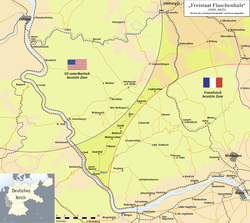Free State Bottleneck
| Free State of Bottleneck | ||||||||||
| Freistaat Flaschenhals | ||||||||||
| Unoccupied territory within post-World War I Germany | ||||||||||
|
||||||||||
| Capital | Lorch | |||||||||
| Languages | German | |||||||||
| Government | Republic | |||||||||
| President | Edmund Pnischeck | |||||||||
| Historical era | Interwar period | |||||||||
| • | Established | 10 January 1919 | ||||||||
| • | Abolished | 23 February 1923 | ||||||||
| Population | ||||||||||
| • | 1920 est. | 17,363 | ||||||||
| Currency | Freistaattaler | |||||||||
|
||||||||||
The Free State of Bottleneck (German: Freistaat Flaschenhals) was a short-lived quasi-state that existed from 10 January 1919 until 25 February 1923. It was formed out of part of the Prussian province of Hesse-Nassau as a consequence of the occupation of the Rhineland following World War I. The Bottleneck is now part of the modern German states of Hesse and Rhineland-Palatinate.
Following the Armistice of 1918, Allied forces occupied the German territory west of the Rhine. To maintain a military presence on the eastern side, the Allied powers extended their zones of occupation by creating three semi-circular bridgeheads of 30 km (19 mi) radius, radiating from Cologne (British zone), Koblenz (American zone), and Mainz (French zone).
The French and American zones did not meet entirely, leaving a narrow gap on the eastern side of the Rhine containing the Wisper valley, the towns of Lorch and Kaub, and villages of Lorchhausen, Sauerthal, Ransel, Wollmerschied, Welterod, Zorn, Strüth and Egenrod.
Surrounded by the two Allied bridgeheads, the Rhine to the south-west and no roads nor railways to speak of towards the north-east, this tiny region was effectively cut off from the rest of Germany and subsequently separated from the administration of the Weimar Republic.
Owing to the circular nature of the Allied bridgeheads, this enclosed territory took on the shape of a bottleneck, hence the name that was given to the microstate, when it was declared on 10 January 1919.
The region contained approximately 17,000 people and its largest town, Lorch, was established as its capital. The mayor of Lorch, Edmund Pnischeck, was subsequently elected as president of this small territory. Pnischeck headed the Bottleneck's administration for the time of its existence, which even oversaw the production of its own stamps and currency.
...
Wikipedia

